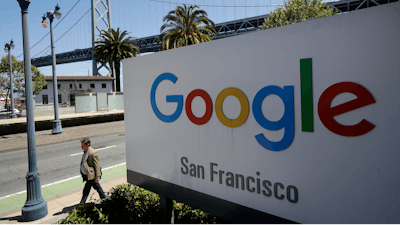
SAN FRANCISCO (AP) — A group of states led by Texas is expected to announce an investigation into Google on Monday to examine whether the Silicon Valley tech giant has gotten too big and effective at stomping or acquiring rivals.
The probe is the latest blow against big tech companies as antitrust investigations ramp up in the U.S. and around the world. A separate group of states announced an investigation into Facebook's dominance on Friday. The Department of Justice, the Federal Trade Commission and Congress are also conducting probes.
Texas Attorney General Ken Paxton has said only that the investigation will look at "whether large tech companies have engaged in anticompetitive behavior that stifled competition, restricted access, and harmed consumers." Reports in The Washington Post and The Wall Street Journal say Google will be the primary target.
Google expects state attorneys general will ask it about past similar investigations in the U.S. and internationally, senior vice president of global affairs Kent Walker wrote in a blog post Friday.
Google's parent company, Alphabet, has a market value of more than $820 billion and controls so many aspects of the internet that it's hard to imagine surfing the web for long without running into at least one of its services. Experts believe the antitrust probe could focus on at least one of three aspects of Google's business that have caught regulators' eyes.
An obvious first place to look could be online advertising. Google will control 31.1% of global digital ad dollars in 2019, according to eMarketer estimates, crushing a distant second place Facebook. And many smaller advertisers have argued that Google has such a stranglehold on the market that it becomes a system of whatever Google says, goes — because the alternative could be not reaching customers.
"There's definitely concern on the part of the advertisers themselves that Google wields way too much power in setting rates and favoring their own services over others," said Jen King, the director of privacy at Stanford's Center for Internet and Society.
Critics often point to Google's 2007 acquisition of online advertising company DoubleClick as pivotal to its advertising dominance.
Europe's antitrust regulators slapped Google with a $1.7 billion fine in March unfairly inserting exclusivity clauses into contracts with advertisers, disadvantaging rivals in the online advertising business.
Another visibly huge piece of Google's business is its search platform, often the starting point for millions of people when they go online. Google dwarfs other search competitors and has faced harsh criticism in the past for favoring its own products over competitors at the top of search results. European regulators have also investigated here — ultimately fining Google for promoting its own shopping service. Google is appealing the fine.
Google has long argued that although its businesses are large, they are useful and beneficial to consumers. But it appears regulators are growing more concerned not just with the effects on regular internet users, but on smaller companies as well.
"On the one hand, you could just say, 'well Google is dominant because they're good,'" King said. "But at the same time, it's created an ecosystem where people's whole internet experience is mediated through Google's home page and Google's other products."
One outcome antitrust regulators might explore is forcing Google to spin off search as a separate company, she said.
Then there's Google's smartphone operating system, Android. Another acquisition of Google's, the system is the most widely used in the world.
European regulators have also fined Google to the tune of $5 billion for tactics involving Android, finding that Google forced handset makers to install Google apps, thereby increasing its reach. Google has since allowed more options for alternative browser and search apps to European Android phones.
It's also possible U.S. states won't follow in Europe's footsteps. They could, for instance, focus on areas such as Google's popular video site YouTube, yet another acquisition Google made, that time in 2006.
Google executive Walker emphasized that the company's products help people every day.
"Google is one of America's top spenders on research and development, making investments that spur innovation: Things that were science fiction a few years ago are now free for everyone_translating any language instantaneously, learning about objects by pointing your phone, getting an answer to pretty much any question you might have," he wrote.






















